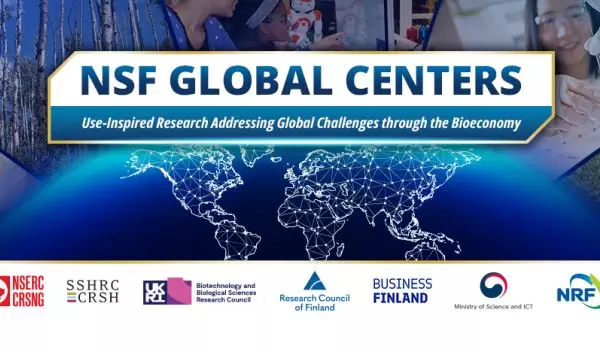
NSF launches Global Centers 2024 competition in partnership with five countries
Today, the U.S. National Science Foundation (NSF) and the National Endowment of the Humanities (NEH) joined partner funding agencies from Canada, Finland, Japan, the Republic of Korea and the United Kingdom in announcing the launch of the Global Centers 2024 competition, with the theme "Addressing Global Challenges through the Bioeconomy."
Winning teams will be awarded up to $5 million to implement new Global Centers — international, interdisciplinary collaborative research centers that will apply best practices of broadening participation and community engagement to develop use-inspired research on the bioeconomy. The centers will also create education and workforce development opportunities for students and early-career researchers while enhancing diversity, equity, inclusion and accessibility across the global STEM enterprise.
"The Global Centers 2024 competition is a testament to NSF's commitment to global partnerships that are advancing critical innovations in the bioeconomy and enabling new solutions to some of our most important global challenges," said NSF Director Sethuraman Panchanathan. "I am especially excited about the range of international partners that are working together on this project. The shared values that underpin our commitments to robust research collaborations are fostering new breakthroughs and supercharging innovation at the frontiers of the bioeconomy."
The 2024 competition is an NSF-led activity, coordinated through NSF's Global Center program with the NEH, and co-sponsored with five other countries' science agencies: Canada's Natural Sciences and Engineering Research Council (NSERC) and Social Science and Humanities Research Council (SSHRC); Finland's Research Council of Finland (RCF) and Business Finland (BF); the Japan Science and Technology Agency (JST); the Republic of Korea's Ministry of Science and Information and Communication Technology (MSIT) and National Research Foundation (NRF); and the United Kingdom's U.K. Research and Innovation (UKRI).
Focused on the bioeconomy — the share of the economy based on products, services and processes derived from living systems — the 2024 competition will prioritize holistic, multidisciplinary projects, that demonstrate large-scale, international collaboration to advance science within the scope of the competition's theme and may include research from any combination of disciplines supported by NSF. To achieve maximal outcomes and benefits, submissions are expected to integrate crosscutting objectives into the project's research outlines and the proposed center's framework. These include plans for public engagement, the collaborative generation of research activities, workforce development, education and strategies and anticipated impacts on the communities the center serves, clearly stated.
The Global Centers program encourages proposal submissions designed to enhance diversity within STEM, with priority given to teams whose projects involve the participation of historically under-represented or underserved populations, minority-serving institutions, primarily undergraduate institutions and/or two-year colleges. Proposals from Established Program to Stimulate Competitive Research (EPSCoR) jurisdictions are especially encouraged.
Proposals solicited for this competition will fall under two overarching categories: "Leveraging Biodiversity Across the Tree of Life to Power the Bioeconomy" and "Biofoundries."
Leveraging Biodiversity Across the Tree of Life to Power the Bioeconomy includes research on all manner of organisms and how they interact — from microbes to plants to animals — and the application of comparative genomics to identify similarities and differences that can be harnessed in novel biotechnologies and biomanufacturing processes.
Biofoundries include using the design-build-test-learn process in biology to facilitate iterative biological engineering — allowing researchers to test large-scale genetic designs and incorporate state-of-the-art approaches at the interface of artificial intelligence and statistical sciences to enhance the design process.
Examples of research areas encompassed by the two categories include data for the bioeconomy, biocomputing, microbial biodiversity, plant genomics, precision agriculture, green economy, economic and policy perspectives, ethical implications of bioeconomy technologies, metabolomics, bioengineering, synthetic biology, metabolic engineering, rapid prototyping of biological designs and biorefineries.
Global Centers program anticipates awarding 5 to 7 teams from the 2024 competition, with NSF and NEH supporting U.S.-based researchers up to $5,000,000 for four to five years. Foreign researchers will be supported by their respective country's funding agency (NSERC, SSHRC, RCF, BF, JST, MSIT, NRF and UKRI) with similar amounts of funds.
The Global Centers 2024 competition is poised to create prominent, enduring, international centers of research excellence that generate crucial knowledge, empower communities and develop innovative solutions that address global challenges. Outcomes fueled by the 2024 class of Global Centers will also strengthen the foundations of international cooperation between partner nations and make valuable and unique contributions to key areas highlighted in President Joe Biden's "Executive Order on Advancing Biotechnology and Biomanufacturing Innovation for a Sustainable, Safe, and Secure American Bioeconomy" and the report developed pursuant to the order: Bold Goals For U.S. Biotechnology And Biomanufacturing.
To learn more about this funding opportunity and how to submit a proposal, visit the NSF Global Centers webpage.


